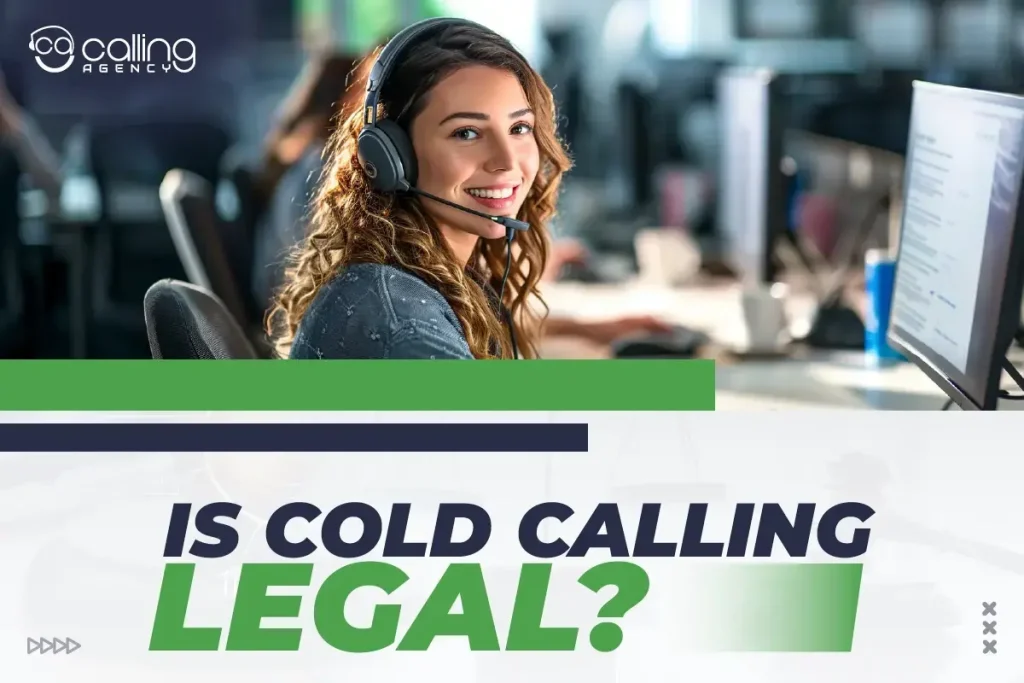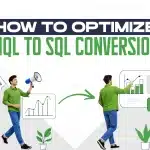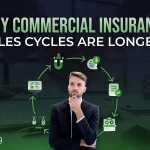Cold calling is a proactive sales method involving making unsolicited phone calls and using excellent communication skills to introduce the product or service, generate leads or close sales.
This is the official definition of cold calling. In general, you list phone numbers of people who may be interested in purchasing what you are offering. Although only 2% of cold calls usually generate sales, the number can be increased by following effective cold-calling methods.
However, different countries have varying rules and regulations concerning cold calling. Thus, the first question that appears is, “Is cold calling legal?” or if it is valid then does it work today? The straightforward answer is “Yes.” But, you need to follow some strict rules when conducting cold calling.
Once you understand these regulations well, your cold-calling success will increase significantly. Here, we will discuss the existing rules and regulations regarding cold calling in different countries. Let’s begin:
Understanding Cold Calling Laws
Cold calling is one of the oldest and most effective methods of outbound marketing. However, different regions have different legal laws about this method. Your business could be subjected to hefty fines without proper compliance with these laws.
In general, your business must get consent from the recipients before making marketing calls. The most important regulations you should know about are:
- Telephone Consumer Protection Act (TCPA) in the U.S.
- The General Data Protection Regulation (GDPR) in the EU
- The Privacy and Electronic Communications Regulations (PECR) in the UK
- Australian Consumer Law (ACL) in Australia
All of these regulations involve maintaining and respecting a strict DNC (do-not-call) list and being transparent about the cold caller’s identity and purpose. Additionally, these laws state that you must give your leads an easy opt-out mechanism so they do not receive further marketing calls.
Let’s discuss the legal framework and legal issues in detail right below:
Legal Framework
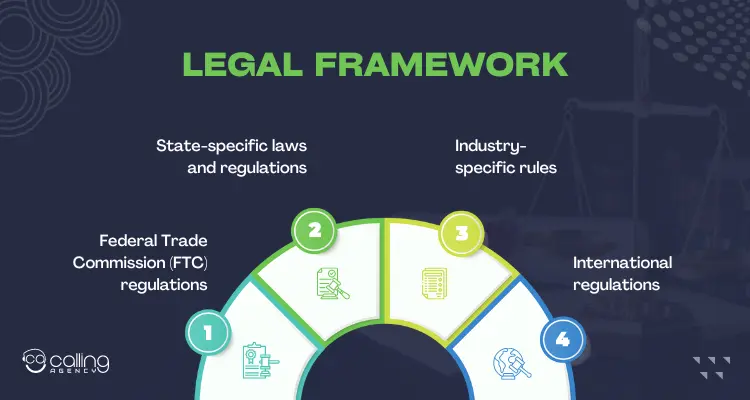
The legal framework determines the scope of where cold calling is considered legal. There have been generalized FTC regulations as well as state-specific laws and regulations. Additionally, these laws can vary depending on the industry and internationally.
Therefore, we will discuss the legal framework in 4 different sections:
- Federal Trade Commission (FTC) regulations
- State-specific laws and regulations
- Industry-specific rules
- International regulations
Federal Trade Commission Regulations
FTC regulates cold calling through the Telemarketing Sales Rule (TSR). The fundamental rules TSR enforces are:
- Telemarketers should clearly identify themselves and clarify their purpose at the beginning of each call.
- The best time to be selected for cold calling and it should be conducted between 8:00 a.m. to 9:00 p.m. local time.
- Avoid calling numbers registered in the DNC registry, and keep the list updated.
- Have written consent from the client before making any monetary transaction.
- B2B exemption exists, but B2C calls must maintain all the regulations completely.
These regulations are designed to protect consumers from potentially fraudulent telemarketing practices. Thus, telemarketers can ensure transparency, fairness, and consumer privacy. If any of these regulations are not maintained, your business can face serious penalties.
State-specific Laws and Regulations
As mentioned before, the FTC enforces cold-calling regulations all over the USA. However, state telemarketing rules can vary significantly and can be stricter.
For example, Florida and Texas regulations require telemarketers to register and renew their registration annually, even if you’ve registered an LLC in Florida or Texas. While New York and Georgia have a wide calling window, Maryland has the least.
Additionally, Indiana telemarketers must scrub their call lists against national and state-specific DNC lists. States like Oklahoma and Maryland have enacted “mini-TCPA” laws to impose stricter regulations on using autodialers.
Industry-Specific Rules
Telemarketing restrictions can also vary between industries. While the real estate and architecture industries enjoy less regulated terms, the medical industry cold-calling needs to follow HIPAA and PHI regulations, as well as the TCPA and TSR.
In addition to the following rules, different industries have different regulations regarding DNC lists, calling hours, and disclosure requirements.
International Regulations
As mentioned earlier, the regulations change greatly depending on the region you are reaching, as do the restrictions on TCPA, GDPR, PECR, ACL, etc.
Here is a table highlighting the differences between international regulations,
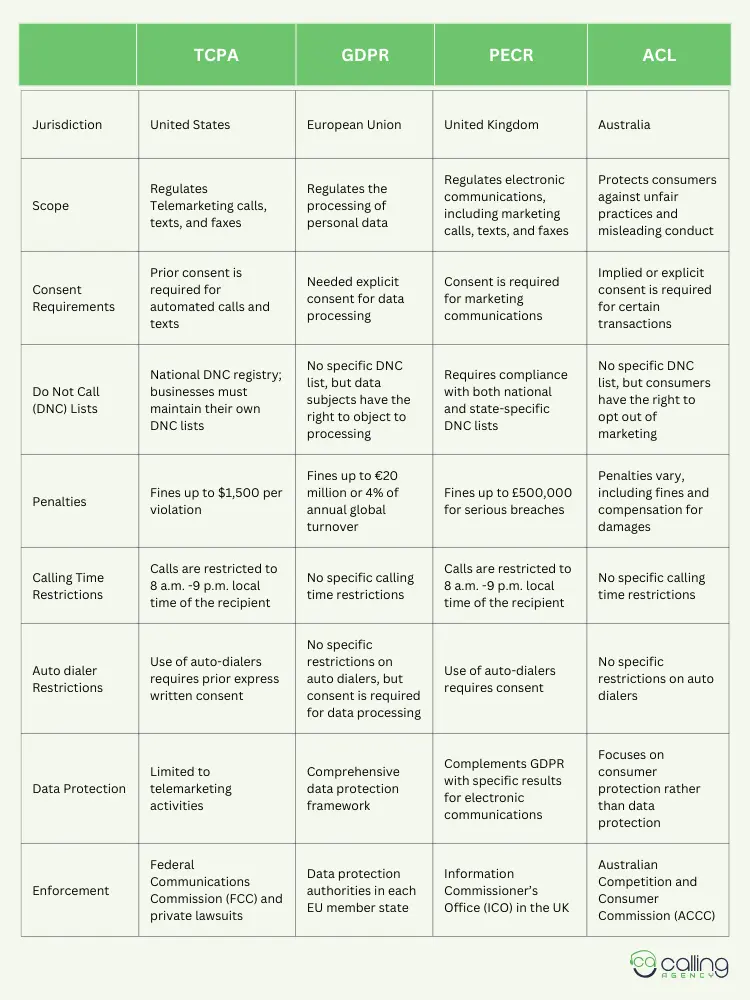
Legal Issues Associated with Cold Calling

Now that you understand the legal framework well let’s discuss the legal issues. In general, the legal issues highly revolve around the following factors:
- Do Not Call (DNC) registry violations
- Robocalling and auto-dialing laws
- Telephone Consumer Protection Act
- False advertising and deceptive practices
- Consent and authorization requirements
Let’s discuss them in detail:
Do Not Call (DNC) Registry Violations
The Do Not Call, or DNC registry, is a database that allows consumers to opt out of receiving unsolicited telemarketing calls. The Federal Trade Commission (FTC) regulates this registry. By registering here, one can decide what marketing calls they may receive and which ones to avoid.
As a telemarketer, you should regularly check this registry and remove the numbers registered here to avoid fines and legal action. This will also effectively improve your cold-calling success. Calls from political organizations, charities, and businesses with existing customers are exempt from these regulations.
Robocalling and Auto Dialing Laws
Tele-callers often use robocalling or auto-dialing to enhance their cold-calling measures for better convenience. However, TPCA regulations restrict this practice if you do not have prior consent from your client.
Additionally, if you are using robocalling measures, you must implement an automated, interactive opt-out mechanism in every robocall to allow your customers to easily request no further calls.
Telephone Consumer Protection Act (TCPA)
The Telephone Consumer Protection Act (TCPA) 1991 establishes several key provisions to regulate cold calling and protect consumer privacy. Some of the important aspects of this act include obtaining prior consent, setting up call time restrictions, identifying callers, and establishing an opt-out mechanism.
The FCC enforces these provisions, and its goal is to balance business needs with consumer privacy rights. As a cold caller, you should be well aware of these regulations and maintain them to avoid fines and other legal consequences.
False Advertising and Deceptive Practices
False advertising and deceptive practices in cold calling involve making misleading, false, or exaggerated claims about a product or service to persuade potential customers. This can include providing incorrect information about the benefits, features, or pricing of a product.
Engaging in false advertising and deceptive practices during cold calling can lead your organization to fines, penalties, lawsuits, reputation damage, and regulatory actions. Some states may have their own consumer protection laws. Violating these laws may cost you additional fines and legal consequences.
Consent and Authorization Requirements
As a cold caller, you must follow the TCPA, GDPR, etc., regulations that require prior consent before making automated calls. While taking consent helps you avoid legal fines and actions, it also helps in building consumer trust, reduces complaints, and helps you follow ethical practices.
Therefore, you need to clearly explain the purpose of your call, keep a record of the consent, regularly scrap your list with the DNC list, and have an effective opt-out mechanism. Additionally, regularly training your telemarketers and using technology to keep track of consent and authorization can help you maintain those strict regulations.
When is Cold Calling Illegal?
There are several instances where cold calling can be illegal. Here are some scenarios where cold calling is illegal, and you should avoid them at all costs.
- Calling Numbers on the DNC Registry: Calling phone numbers recorded on the DNC registry without obtaining consent previously is considered as violating the law. This is true for both residential and mobile numbers.
- Using Auto Dialers Without Consent: Under the TCPA, using pre-recorded messages or making automated calls without proper consent is illegal.
- Calling Outside Permissible Hours: Telemarketing calls made before 8 a.m. or after 9 p.m. local time of the recipient are restricted.
- Misleading of Deceptive Practices: Offering false or misleading information about the product or service your telemarketers are marketing can be punishable by the law. Failing to disclose important terms and conditions is also considered under this regulation.
- Caller ID Spoofing: Under the Truth in Caller ID Act, using false or misleading caller ID information to disguise the caller’s identity is prohibited.
Final Words
As per the discussion above, it is evident that cold calling is a legal method of inbound marketing. However, there are certain laws you will need to understand and maintain to avoid legal consequences.
With a good understanding of TSA, TCPA, and the Truth in Caller ID Act, you can effectively conduct your telemarketing efforts within the US. However, if your state or industry has any additional requirements, you must also comply with those regulations.
In addition, if you are outreaching internationally through cold calling, you will also need a good understanding of international regulations like GDPR, ACL, PECR, TCCCPR, etc. Otherwise, your organization may be subjected to fines, and you can lose your tele-caller license.

